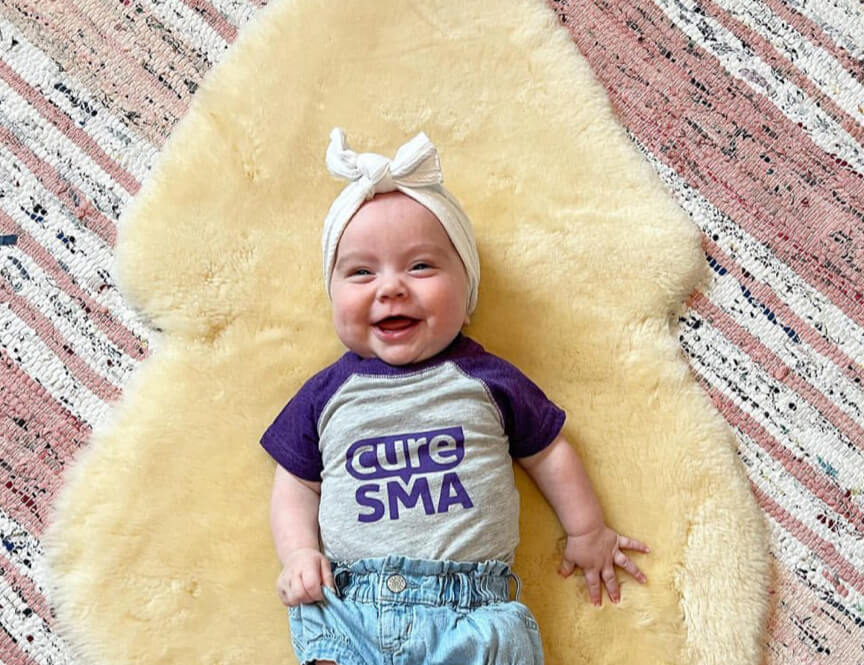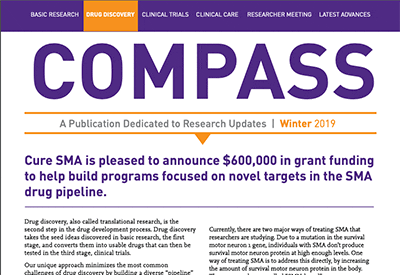Cure SMA has awarded a $150,000 research grant to Brunhilde Wirth, PhD, at Institute of Cologne, Germany, for her project, “Study of combinatorial therapy based on SPINRAZA together with a novel protective genetic modifier.”
Based on so-called SMA discordant families, in whom SMN1-deleted individuals remain asymptomatic, Dr. Wirth and her team have recently identified two genes which may function as human SMA protective modifiers: plastin 3 (PLS3) and neurocalcin delta (NCALD). They have also identified another gene that interacts with PLS3, called CHP1, which may be protective against SMA symptoms when it is down-regulated.
This grant to Dr. Wirth will allow for further optimization and development of ASOs directed at downregulating CHP1. The goal of this project is to develop these ASOs as a combinatorial therapy to be used with SMN-upregulating therapies, such as Spinraza.
Meet Dr. Wirth
Who are you?
I am a human geneticist and have been leading my own research group since 1990. Since 2003 I am a full professor and chair of the Institute of Human Genetics at the Medical Faculty of the University of Cologne, in Germany. Between 2009-2016 I chaired the scientific program committee of the European Society of Human Genetics and since 2016 I’m the chair of the scientific advisory board of SMA-Europe.
How did you first become involved with SMA research?
In 1990 I became a group leader at the Institute of Human Genetics in Bonn. The SMA gene had just been mapped on chromosome 5q. I just finished my postdoc at the ICRF in London on polyposis coli, which is also localized on 5q and had access to a lot of reagents, which had been essential for genetic and physical mapping at that time. Moreover, colleagues in Bonn had a strong interest in the clinical genetic side of SMA, which allowed me to get access to blood samples from individuals with SMA and their families. I thought it is a great subject to start working as an independent group leader. I never regretted my decision. It was always challenging and highly exciting research.
What is your current role in SMA research?
My lab has a long lasting deep interest in SMA. We have published over 100 publications on SMA covering a broad field of research from genetics, splicing, epigenetic regulation, genetic modifiers, SMA animal models, cellular mechanism underlying SMA up to preclinical therapeutic approaches.
What do you hope to learn from this research project?
The main goal of the project is to develop a combinatorial therapy using SPINRAZA together with antisense oligonucleotides (ASOs). These ASOs will downregulate a novel SMA protective gene, CHP1, that acts SMN-independently.
How will this project work?
We identified two genes, Plastin 3 (PLS3) and neurocalcin delta (NCALD) in people who have SMN1 deletions, but no SMA symptoms. We believe these genes may be able to help protect these individuals from developing SMA symptoms. Recently we identified another gene that interacts with PLS3 but is protective when downregulated called CHP1. A combinatorial ASO-based therapy aimed at downregulating CHP1 will be studied in SMA mice.
What is the significance of your study?
For the majority of SMA patients carrying only two SMN2 copies, splice correction or activation of the SMN2 gene alone may not be sufficient to maintain lifelong motor neuron and neuromuscular junction function. We hope that using combinatorial therapies targeting SMN-dependent and SMN-independent pathways – based on protective genetic modifiers – might give additional functional support to affected cells, similar to that seen in asymptomatic SMN1-deleted individuals.
Basic Research Funding
This grant to Dr. Wirth is part of $1,325,000 in new basic research funding that we’re currently announcing.
Basic research is the first step in our comprehensive research model. We fund basic research to investigate the biology and cause of SMA, in order to identify the most effective strategies for drug discovery. We also use this funding to develop tools that facilitate SMA research.



